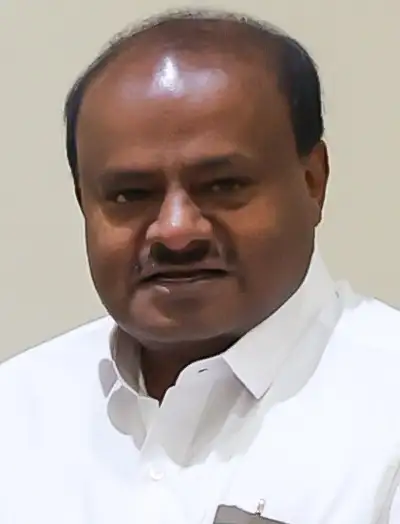HD Kumaraswamy

HD Kumaraswamy
(Age 64 Yr. )
Personal Life
| Education | Bachelor of Science at National College Jayanagar in Bengaluru, Karnataka |
| Religion | Hinduism |
| Nationality | Indian |
| Profession | Politician |
| Place | Haradanahalli, Holenarasipura taluk of Hassan district, Karnataka, India |
Physical Appearance
| Height | 5' 5 |
| Eye Color | Black |
| Hair Color | Black |
Family
| Parents | Father- H. D. Deve Gowda (politician) Mother- Chennamma |
| Marital Status | Married |
| Spouse |
|
| Childern/Kids | Son- H. K. Nikhil Gowda (Actor; from his first wife) Daughter- Shamika K. Swamy (from his second wife) |
| Siblings | Balakrishna Gowda (former Karnataka Administrative Service officer) Shylaja (homemaker) |
Political Career
Kumaraswamy entered politics following the footsteps of his father. He was first elected to the Lok Sabha (the lower house of India's Parliament) from the Kanakapura constituency in 1996. However, his significant rise in state politics began with his election to the Karnataka Legislative Assembly in 2004 from the Ramanagara constituency.
Tenure as Chief Minister
First Term (2006-2007): Kumaraswamy became the Chief Minister of Karnataka for the first time in February 2006 after forming a coalition government with the Bharatiya Janata Party (BJP). However, this partnership was short-lived due to disagreements, leading to the government's collapse in October 2007.
Second Term (2018-2019): His second term began in May 2018 after the state elections resulted in a hung assembly. The Janata Dal (Secular) formed a coalition government with the Indian National Congress. Kumaraswamy’s second tenure was also marked by political instability, leading to his resignation in July 2019 following a series of defections and a vote of no-confidence.
Political Style and Influence
Kumaraswamy is known for his grassroots approach and focus on rural development. Despite his party's regional limitations, he has played a crucial role in Karnataka politics, often acting as a kingmaker in coalition governments. His leadership style emphasizes social welfare programs, infrastructure development, and agricultural support.